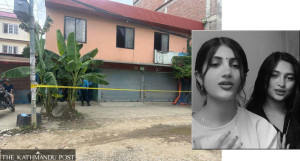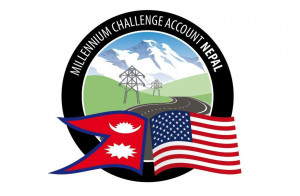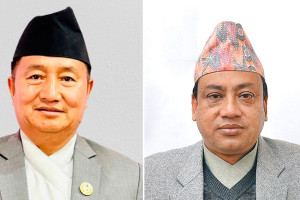National
PM calls National Coordination Council meet to proceed with police integration
The constitution gives provinces explicit authority to set up their own police forces.
Binod Ghimire
Over eight years after the promulgation of the Constitution of Nepal, the federal government is finally restructuring the police force to create provincial police units.
Prime Minister Pushpa Kamal Dahal has called a meeting of the National Coordination Council on Wednesday to formally decide on integrating around two thirds of the Nepal Police’s strength in provincial police forces.
Chaired by the prime minister, the council includes chief ministers of the provincial governments. The home minister; finance minister; minister for law, justice and parliamentary affairs; and the minister for federal affairs and general administration are other council members.
Dahal called the council’s meeting after a broader agreement between the home ministry and the internal affairs ministers from the seven provinces.
“The council’s meeting has been called for Wednesday. The letter our chief minister has received says that police integration is the main agenda,” Mohammad Samim, internal affairs minister of Madhesh Province, told the Post. “We expect the meeting to formally decide on police integration.”
The constitution gives provincial governments explicit authority to have their own police to manage law and order.
After continued pressure from the provincial governments, Dahal on January 17 had given Deputy Prime Minister and Minister for Home Affairs Narayan Kaji Shrestha and other relevant authorities 15 days to complete preparations for the integration. Following the directives, Shrestha met provincial internal affairs ministers for the preparation.
Samim, who was present in the meeting, said Shrestha had assured them that the integration process will commence immediately after the council’s meeting.
“The home minister didn’t oppose any of our demands,” said Samim. “He has said the existing Acts need to be amended to address some issues the provinces have raised. We have been told that the amendment process will move together with the integration.”
The Police Personnel Adjustment Act and the Act to Govern the Operation, Supervision and Coordination of Nepal Police and Provincial Police Forces endorsed in 2019 need to be revised to address the demands of the provinces. The provinces want chief district officers to come under the command of provincial governments. Similarly, Ganga Narayan Shrestha, Bagmati’s internal affairs minister, has demanded that his province get the authority to manage the security of the federal capital.
“A working procedure has been developed based on the Acts to facilitate the integration process,” a senior official at the home ministry told the Post. The Police Personnel Adjustment Act authorises the federal government to assign a deputy inspector general of Nepal Police to serve as provincial police chief. The federal government can transfer such police officers to other provinces or any department of the Nepal Police in consultation with the provincial governments concerned.
However, in case of other personnel adjusted to provincial police forces, the relevant provincial official can transfer such personnel to any police unit within the province.
As per the Organisation and Management Survey of Nepal Police, a total of 54,720 police—50,794 from the infantry and 3,926 from the technical category—will be integrated into the seven provinces. Police officials up to the deputy superintendent will be integrated permanently while the senior officials will be deputed, keeping doors open for them to work in the federal police force.
Seven deputy inspector generals will be deputed provincial police chiefs but they can return to the national police force if they want. Similarly, 21 senior superintendents and 69 superintendents will also be temporarily deputed in the provinces.
The Nepal Police, at present, is 80,000-strong.
As per the survey, the highest number of police, 10,717, will be reorganised under the Koshi police, 9,152 under Madhesh police and 7,304 under Bagmati police. Gandaki province will have a 6,745-strong force, Lumbini will have 9,443 personnel, Karnali 5,458 and Sudurpaschim 5,901.
Led by Madhesh, the provinces are piling pressure on the federal government for police adjustment.
Earlier, on November 9, a team of all-party representatives from Madhesh Province had issued a 30-day ultimatum to Dahal to address their six-point demand, warning of a protest if Kathmandu took no urgent steps to fully implement constitutional provisions for the smooth functioning of provinces.
Later, in December, the other six provinces joined forces with Madhesh to assert their constitutional rights. The internal affairs ministers from all the provinces met Dahal and Shrestha last month to build pressure for the adjustment of the police force and to promulgate a federal civil service law.
On December 6, the Madhesh Provincial Assembly unanimously endorsed a resolution motion registered by the CPN-UML which says provinces should be allowed to exercise all authorities delegated to them by Schedule 6 of the Constitution of Nepal. An all-party team led by Chief Minister Yadav had presented their resolution before the prime minister on December 10.
All the provinces have endorsed provincial police laws to clear legal hurdles in managing their own police forces. However, they cannot set up such forces unless the federal government adjusts the existing police force at the provincial level.




 26.21°C Kathmandu
26.21°C Kathmandu
















